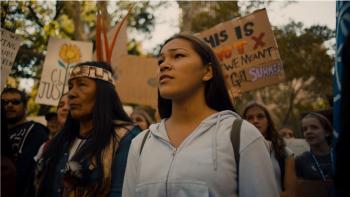Image Caption
Summary
Local Journalism Initiative Reporter
Windspeaker.com
The Weengushk International Film Festival (WIFF) brings together filmmakers from around the world who explore Indigenous topics while breaking down stereotypes and racial barriers. This year’s festival is online due to the pandemic. Opening night is Thursday, July 8.
The film guide shows so many films it might seem tricky to choose and schedule. That’s why organizers planned for wide open windows of time until July 11 to choose and purchase tickets. Audiences will have seven days to watch their films after tickets are purchased.
Subjects include traditional knowledge keepers, activists, healers and even architects, with 95 per cent of the films created by Indigenous filmmakers.
This is the fourth year of the festival and the second year of running online due to the pandemic. Normally the film fest is in person, celebrated on Manitoulin Island, Ont.
There are more than 40 films, along with free daily workshops and Q&A’s with filmmakers. The audience is invited to join in the conversations, hosted by filmmaker and Weengushk board member Phylis Ellis.
Over the past pandemic year, organizers and curators have been planning and preparing the festival.
Adam Moffat is the project manager. He has an events and arts administration background.
Moffat’s previous experience is as a producer with the Toronto Music festival. He brings a specific enthusiasm for all the music woven into the online festival weekend.
There will be performances by Leonard Sumner, Relic Kings, Jace Martin, The Six Nations Women Singers, Murray Porter, The Poets and the Cheechoo Martin Band.
Dr. Shirley Cheechoo is the founder and artistic director of Weengushk Film Institute.
Moffat focuses on “making sure everything is moving along, so Shirley can really focus on the artistic side of our festival and programming some amazing films. She has worked in the film industry for decades. Shirley started the Weengushk Film Institute around 20 years ago, which is an Indigenous training program.”
What makes the program unique is including working with and connected to the land, besides all the regular tech and editing of regular film school programs.
“A lot of Indigenous knowledge is embedded into this film program,” said Moffat.
Cheechoo started the festival four years ago, originally as a platform to share student films from the institute.
The films are organized into 10 themed series. Cheechoo and Gloria Panacheese curated the series, including themes of environmentalism and activism: “Water is Life” to “Changing the Future”.
The Water Walker by filmmaker James Burns is a short documentary tracing the roots, passion and perseverance of young Autumn Peltier, an influential figure in the Indigenous and global youth-led environmental movement.
In 2019, 14-year-old Autumn was named the chief water commissioner by the Anishinabek Nation, a position previously held by her late Great Aunt Josephine Mandamin, an Elder and founding member of the water protectors movement.
Adding to the richness of the storytelling, the filmmakers incorporate Métis artist Christi Belcourt’s paintings, brought to life with stunning animated sequences that capture the sacred qualities of water.
There is a call for submissions every fall, in October or November. “Any filmmaker across the world can submit to the festival,” said Moffat.
Some of the themes emerged organically from the strong submissions that came in, such as the two-spirit series, said Moffat.
“Our two-spirited series happened because we were very fortunate to have a large number of two-spirited filmmakers submitting.”
WIFF is an Indigenous-based organization that “seeks to build solidarity with those in Canadian society with lived experiences similar to those of Aboriginal peoples,” Moffat explained.
Films can start conversations. Collaborations can build bridges between BIPOC communities that might not seem to have much in common. Once the conversations begin, the similarities surface, he said.
Local Journalism Initiative Reporters are supported by a financial contribution made by the Government of Canada.

